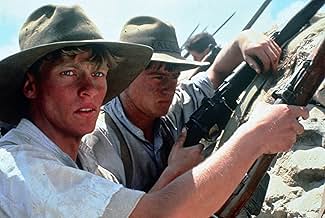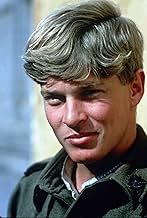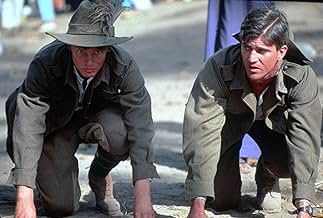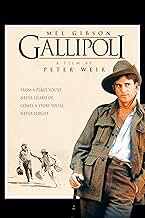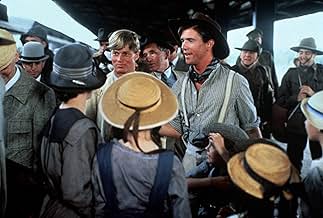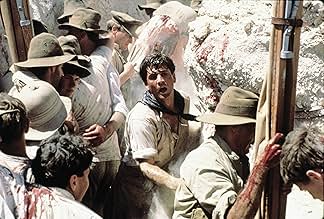IMDb रेटिंग
7.4/10
43 हज़ार
आपकी रेटिंग
दो ऑस्ट्रेलियाई धावकों को युद्ध की क्रूर वास्तविकताओं का सामना करना पड़ता है जब उन्हें तुर्की में गैलीपोली अभियान में लड़ने के लिए भेजा जाता है।दो ऑस्ट्रेलियाई धावकों को युद्ध की क्रूर वास्तविकताओं का सामना करना पड़ता है जब उन्हें तुर्की में गैलीपोली अभियान में लड़ने के लिए भेजा जाता है।दो ऑस्ट्रेलियाई धावकों को युद्ध की क्रूर वास्तविकताओं का सामना करना पड़ता है जब उन्हें तुर्की में गैलीपोली अभियान में लड़ने के लिए भेजा जाता है।
- पुरस्कार
- 11 जीत और कुल 6 नामांकन
Charles Lathalu Yunipingu
- Zac
- (as Charles Yunupingu)
फ़ीचर्ड समीक्षाएं
There is not a lot wrong with this movie. The entire thing seems authentic - meaning you feel like you're in Australia in 1915. You are living on a farm, running in a race and ultimately in a war.
What is also very extraordinary is that there is not really a lot that happens, there is barely a plot. But it doesn't matter, because Peter Weir is a master storyteller. The actors are all superb and your heart may hurt at the climax - mine did.
Unforgettable, like all great movies.
What is also very extraordinary is that there is not really a lot that happens, there is barely a plot. But it doesn't matter, because Peter Weir is a master storyteller. The actors are all superb and your heart may hurt at the climax - mine did.
Unforgettable, like all great movies.
Peter Weir has long been one of my favorite directors, and he has had a career consumed by subtle, quiet, lingering films. He can make the most banal concept seem thrilling and suspenseful; a perfect example is the Harrison Ford film "Witness." It could have easily become a stupid, insulting, exploitative "thriller." The ending is, in retrospect, quite ridiculous. But Weir has a strange ability to make anything seem realistic.
"Gallipoli" is one of his older films, from 1981, and it stars a huge cast of names - most famous today, of course, Mel Gibson...whose name is now splattered across the front of the DVD case.
The story is a true one and follows a group of young Australian men who join the ANZACs in World War I. They are sent to Gallipoli, and amidst personal and emotional turmoil they must learn to band together and fight the Turkish Army.
The movie is long, as another reviewer on the site points out. But all of Weir's films are. What I didn't like about his most recent - "Master & Commander" - is that it used special effects (exteriors of ships, etc.) and action sequences (raging storms) to compensate for the slow bits... and came across (to me anyway) as quite dull and down-trodden.
"Gallipoli" is a great film - slow, subtle, low-key. It's a bit like an Australian version of "All Quiet on the Western Front." I'd recommend it to anyone who enjoys slower films and can appreciate character-driven dramas. Don't go near it if your attention span was dimming during "xXx2."
"Gallipoli" is one of his older films, from 1981, and it stars a huge cast of names - most famous today, of course, Mel Gibson...whose name is now splattered across the front of the DVD case.
The story is a true one and follows a group of young Australian men who join the ANZACs in World War I. They are sent to Gallipoli, and amidst personal and emotional turmoil they must learn to band together and fight the Turkish Army.
The movie is long, as another reviewer on the site points out. But all of Weir's films are. What I didn't like about his most recent - "Master & Commander" - is that it used special effects (exteriors of ships, etc.) and action sequences (raging storms) to compensate for the slow bits... and came across (to me anyway) as quite dull and down-trodden.
"Gallipoli" is a great film - slow, subtle, low-key. It's a bit like an Australian version of "All Quiet on the Western Front." I'd recommend it to anyone who enjoys slower films and can appreciate character-driven dramas. Don't go near it if your attention span was dimming during "xXx2."
Filmed in a period of cinematographic transition, between, on the first hand, the old Hollywood productions like The Longest Day (Ken Annakin and 4 others, 1962), A Bridge Too Far (Richard Attenborough, 1977) or The Great Escape (John Sturges, 1963) sometimes completely disconnected from the reality and the atrocities perpetrated on the battlefield by both sides and, on the other hand, darker and immeasurably more realistic productions from the late 70s, such as Come and See (Elem Klimov, 1985), The Deer Hunter (Michael Cimino, 1978), Das Boot (Wolfgang Petersen, 1981) and Le vieux fusil (Robert Enrico, 1975).
Indeed, if the first part of this movie is of a distressing insouciance, the two main protagonists striving to leave Australia to join the peninsula of Gallipoli, Turkey, like two children expecting their next summer camp, the second part is cold and raw, unbridled and cruel. In this respect, the film is appropriately lulled by the album Oxygène (Jean-Michel Jarre, 1976) for the sequences full of hope and carefree, camaraderie and friendship and the adagio of Albinoni (Remo Giazotto, 1945) for the poignant sequences of courage and sacrifice.
A moving film with a neat realization and an excellent cast.
Indeed, if the first part of this movie is of a distressing insouciance, the two main protagonists striving to leave Australia to join the peninsula of Gallipoli, Turkey, like two children expecting their next summer camp, the second part is cold and raw, unbridled and cruel. In this respect, the film is appropriately lulled by the album Oxygène (Jean-Michel Jarre, 1976) for the sequences full of hope and carefree, camaraderie and friendship and the adagio of Albinoni (Remo Giazotto, 1945) for the poignant sequences of courage and sacrifice.
A moving film with a neat realization and an excellent cast.
I taught HS history and used very few commercial movies in teaching...the exceptions included GALLIPOLI and PATHS OF GLORY and the newer remake of ALL QUIET. I've never watched a film that builds plot, mood and theme any better than Gallipoli. While there are many light-hearted and humorous forays which add to character development, the ongoing drum-beat of the film is war, war, war--attack, attack, attack. I can't imagine any better musical score or musical editing:the juxtaposition of elegant Strauss waltzes the night before debarkation with the funereal Adagio as the troops cross the water is genius. I'm surprised that we haven't seen more of Marc Lee-the idealistic Archie. He does a wonderful job along with a VERY young Mel Gibson. When I showed the movie to my classes I was careful to watch THE STUDENTS as the final scenes arrived rather than the film. Now THAT was telling! I absolutely commend this film to all! (ADDED)BTW...Brits---try not to take the criticism of the military operation as criticism of YOU...I think the entire film was meant to be an indictment of war as an instrument of national policy. Your very own John Keegan observed that once wars begin, they have a way of creating their own momentum and justification. It's for this reason that Herodotus said that "all wars are popular in their inception". The film, as I viewed it, was about the futility of war, the fixation of military commanders to fix the "previous war" and the price we pay for stupidity. The lesson should not be lost on the US in Iraq either.
How much of Mel Gibson's success as a director does he owe to Peter Weir? He must have had a wonderful experience working with him on this movie. Perfect depiction of innocents at war - the young soldiers who didn't know how cruel the world (and their officers) could be. Has a better depiction of the Australian character ever been put on a screen? Screenplay by David Williamson is spot-on. (He is the "long streak of pelican s**t" who has to be "sorted out" while playing football near the Sphinx!) (viewed 10/16)
क्या आपको पता है
- ट्रिवियाAlthough he is wears an AIF uniform, Colonel Robinson is often mistaken for an Englishman because he has a clipped Anglo-Australian accent, typical of the time.
- गूफ़The Battle of the Nek was not a diversion for the British landing at Suvla, it was a diversion for an attack by New Zealand attack on Sari Bair.
- भाव
[first lines]
Jack: What are your legs?
Archy Hamilton: Springs. Steel springs.
Jack: What are they going to do?
Archy Hamilton: Hurl me down the track.
Jack: How fast can you run?
Archy Hamilton: As fast as a leopard.
Jack: How fast are you going to run?
Archy Hamilton: As fast as a leopard!
Jack: Then let's see you do it!
- साउंडट्रैकAdagio in G Minor for Strings & Organ
Composed by Tomaso Albinoni
Performed by Orchestre de Chambre Jean-François Paillard
R.C.A. Records
टॉप पसंद
रेटिंग देने के लिए साइन-इन करें और वैयक्तिकृत सुझावों के लिए वॉचलिस्ट करें
विवरण
- रिलीज़ की तारीख़
- कंट्री ऑफ़ ओरिजिन
- भाषाएं
- इस रूप में भी जाना जाता है
- Galipolje
- फ़िल्माने की जगहें
- Gallipoli Beach, Coffin Bay, South Australia, ऑस्ट्रेलिया(setting: Anzac Cove)
- उत्पादन कंपनियां
- IMDbPro पर और कंपनी क्रेडिट देखें
बॉक्स ऑफ़िस
- बजट
- A$26,00,000(अनुमानित)
- US और कनाडा में सकल
- $57,32,587
- दुनिया भर में सकल
- $57,38,604
इस पेज में योगदान दें
किसी बदलाव का सुझाव दें या अनुपलब्ध कॉन्टेंट जोड़ें



